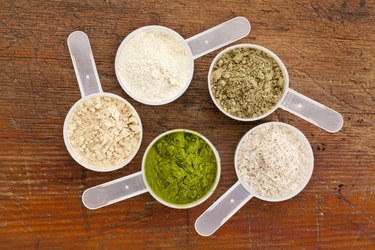
Most women get enough protein without turning to supplements, but a credible body of scientific research does support benefits of supplementing with protein powder. Results are not the same for everyone, but in a significant number of women, protein powder has the potential to produce successful weight loss, better body composition and lower risk factors for disease.
Weight Loss
Video of the Day
In a study published in 2007 in the journal "Metabolism," women with obesity who used protein shakes as meal replacements over a 16-week trial period lost more than 10 percent of their body weight and 20 percent of body fat. The women followed a calorie-restricted daily diet consisting of fruits, vegetables, one full prepackaged entree and three protein shakes. All of the shakes used either soy or casein as their primary protein source, with the type of protein powder apparently not affecting weight-loss results.
Video of the Day
Strength and Mass
Muscle mass is a particular asset for women because it is lean, it burns calories more efficiently than body fat and it makes it easier to perform everyday physical tasks. According to research published in 2006 in the "British Journal of Sports Medicine," women who regularly strength train may be able to benefit from supplements such as whey powder because they provide high quality and quickly digestible protein, which encourages consistent construction and reparation of lean muscle fibers.
Muscle Maintenance
As they age, women experience sarcopenia, a gradual and natural loss of muscle mass. Osteoporosis is also a risk for women that increases with aging. In research published in 2013 in the "Journal of Women and Aging," however, post-menopausal women who supplemented with protein powder and performed occasional resistance training over a 12-week period experienced significantly greater muscle and bone strength gains than women who went without the supplement, reducing their risk factors for both sarcopenia and osteoporosis. Women who took a daily soy protein supplement without exercising also experienced gains in bone and muscle strength, although to a lesser degree than those who supplemented and exercised.
The Limitations
Protein powder contains many of the same nutrients that whole sources of protein do, and there's nothing the supplement can provide that the whole foods can't. In fact, whole foods contain some beneficial phytonutrients and antioxidants that can't be replicated in supplements, so they are typically healthier choices. The International Society of Sports Nutrition recommends whole foods over protein supplements for both men and women.
Related Reading
Women can benefit from protein powder supplements just as men do. The only caveat is that you consume it within your daily needs for protein. You can estimate your daily need for protein by multiplying 0.36 by your body weight in pounds to determine how many grams of protein you need each day. If you are physically active, you need an increased amount of protein. But protein powder itself won't help you build muscle. Exercise promotes muscle growth. Consult your doctor before starting a protein powder regimen.
Types
There are protein supplements on the market marketed specifically toward women, but protein powders generally contain similar ingredients. Choose one that contains a high-concentration of protein itself instead of a long list of additives and fat. Common types of protein powder include whey, soy, casein, hemp and egg powders. Any of these powders can support muscle development in men and women alike, but this is only true if you exercise regularly. Exercise helps break down muscle tissue, and the protein rebuilds it.
Study 1
A 2008 clinical study published in "Nutrition and Metabolism" tested the effects of a whey protein supplement on women with obesity. One-hundred fifty women between 25 and 50 years old were randomly assigned to a whey protein group or placebo group. The whey protein group consumed two 10-g whey protein shakes per day over the 12-week test period. The results showed little or no difference between the two groups in terms of muscle growth. However, the whey protein group maintained significantly more muscle and lost more body fat compared to the placebo group. This study suggests whey protein supplements may be beneficial in terms of losing body fat and maintaining lean mass.
Study 2
A 2007 study published in the peer-reviewed journal "Fertility and Sterility" studied the effects of soy protein on postmenopausal women. The women who consumed a 20 g soy protein shake per day exhibited less of an increase in overall body fat, but that was the primary difference between the soy protein group and the placebo group. This study showed soy protein does not directly help women build muscle or maintain lean mass anymore effectively compared to women who don't consume a daily soy protein shake.
Exercise Factor
The key factor for building muscle is consistent resistance training. Two or three resistance training sessions per week is usually adequate. Some protein powders may help you maintain your muscle mass, but resistance training is necessary to build muscle. Resistance training can help women burn body fat and tone their muscles. Protein powders may support the muscle development process, but these supplements aren't right for everyone. Talk to your doctor to determine if a protein supplement would be beneficial to you.
- M.D. Anderson Cancer Center: Whole Foods or Supplements?
- Physicians Committee for Responsible Medicine: The Protein Myth
- Metabolism: Soy Compared to Casein Meal Replacement Shakes With Energy-Restricted Diets for Obese Women
- British Journal of Sports Medicine: Nutritional Aspects of Women Strength Athletes
- Journal of Women and Aging: Effect of Soy Isolate Protein and Resistance Exercises on Muscle Performance and Bone Health of Osteopenic/Osteoporotic Post-Menopausal Women
- Journal of the International Society of Sports Nutrition: International Society of Sports Nutrition Position Stand -- Protein and Exercise